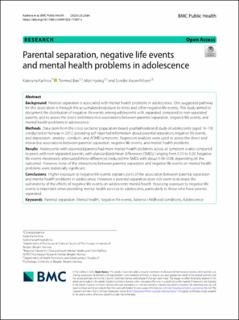| dc.contributor.author | Karhina, Kateryna | |
| dc.contributor.author | Bøe, Tormod | |
| dc.contributor.author | Hysing, Mari | |
| dc.contributor.author | Nilsen, Sondre Aasen | |
| dc.date.accessioned | 2024-03-22T11:44:28Z | |
| dc.date.available | 2024-03-22T11:44:28Z | |
| dc.date.created | 2023-11-30T15:35:53Z | |
| dc.date.issued | 2023 | |
| dc.identifier.issn | 1471-2458 | |
| dc.identifier.uri | https://hdl.handle.net/11250/3123815 | |
| dc.description.abstract | Background
Parental separation is associated with mental health problems in adolescence. One suggested pathway for this association is through the accumulated exposure to stress and other negative life events. This study aimed to document the distribution of negative life events among adolescents with separated compared to non-separated parents, and to assess the direct and interactive associations between parental separation, negative life events, and mental health problems in adolescence.
Methods
Data stem from the cross-sectional population-based youth@hordaland study of adolescents (aged 16–19) conducted in Norway in 2012, providing self-reported information about parental separation, negative life events, and depression-, anxiety-, conduct-, and ADHD symptoms. Regression analyses were used to assess the direct and interactive associations between parental separation, negative life events, and mental health problems.
Results
Adolescents with separated parents had more mental health problems across all symptom scales compared to peers with non-separated parents, with standardized mean differences [SMDs] ranging from 0.15 to 0.20. Negative life events moderately attenuated these differences (reduced the SMDs with about 0.04–0.08, depending on the outcome). However, none of the interactions between parental separation and negative life events on mental health problems were statistically significant.
Conclusions
Higher exposure to negative life events explains parts of the association between parental separation and mental health problems in adolescence. However, a parental separation does not seem to increase the vulnerability of the effects of negative life events on adolescents’ mental health. Assessing exposure to negative life events is important when providing mental health services to adolescents, particularly to those who have parents separated. | en_US |
| dc.language.iso | eng | en_US |
| dc.publisher | BMC | en_US |
| dc.rights | Navngivelse 4.0 Internasjonal | * |
| dc.rights.uri | http://creativecommons.org/licenses/by/4.0/deed.no | * |
| dc.title | Parental separation, negative life events and mental health problems in adolescence | en_US |
| dc.type | Journal article | en_US |
| dc.type | Peer reviewed | en_US |
| dc.description.version | publishedVersion | en_US |
| dc.rights.holder | Copyright 2023 The Author(s) | en_US |
| dc.source.articlenumber | 2364 | en_US |
| cristin.ispublished | true | |
| cristin.fulltext | original | |
| cristin.qualitycode | 1 | |
| dc.identifier.doi | 10.1186/s12889-023-17307-x | |
| dc.identifier.cristin | 2206694 | |
| dc.source.journal | BMC Public Health | en_US |
| dc.relation.project | Norges forskningsråd: 302225 | en_US |
| dc.identifier.citation | BMC Public Health. 2023, 23, 2364. | en_US |
| dc.source.volume | 23 | en_US |

